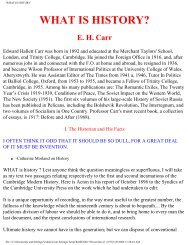The bronze age and the Celtic world - Universal History Library
The bronze age and the Celtic world - Universal History Library
The bronze age and the Celtic world - Universal History Library
Create successful ePaper yourself
Turn your PDF publications into a flip-book with our unique Google optimized e-Paper software.
100 THE BRONZE AGE AND THE CELTIC WORLD<br />
<strong>and</strong> little has been done to catalogue <strong>the</strong>m. <strong>The</strong> formation of an illustrated card<br />
catalogue of all <strong>the</strong> metal objects of <strong>the</strong> <strong>bronze</strong> <strong>age</strong> in <strong>the</strong> museums <strong>and</strong> private<br />
collections in <strong>the</strong> British Isles is in progress, under <strong>the</strong> auspices of a research<br />
committee appointed by <strong>the</strong> British Association for <strong>the</strong> advancement of Science. <strong>The</strong><br />
specimens deposited in EngHsh collections have, for <strong>the</strong> most part, been already<br />
included in this catalogue, <strong>and</strong> it is from this that <strong>the</strong> bulk of <strong>the</strong> statistical matter<br />
relating to <strong>the</strong> British Isles has been derived.<br />
As we have seen in some earher chapters, distribution of certain types of <strong>bronze</strong><br />
implements may be taken as evidence of trade, <strong>and</strong> we have to consider whe<strong>the</strong>r it<br />
was some form of commerce which carried <strong>the</strong> leaf-shaped swords to Irel<strong>and</strong>, Finl<strong>and</strong>,<br />
Podoha <strong>and</strong> Egypt, or whe<strong>the</strong>r this wide distribution betokens some o<strong>the</strong>r form of<br />
movement. Before <strong>the</strong> days of fairly large ships <strong>and</strong> highly organised industry it is<br />
not uncommon to find implements, whe<strong>the</strong>r of flint or obsidian, copper or <strong>bronze</strong>, carried<br />
from country to country, without apparently any general movement of <strong>the</strong> population.<br />
On <strong>the</strong> o<strong>the</strong>r h<strong>and</strong>, when pottery <strong>and</strong> heavier or more easily dam<strong>age</strong>d goods pass from<br />
one centre to ano<strong>the</strong>r, it usually betokens migration. We have seen how this was so<br />
when <strong>the</strong> beakers were carried from Bohemia towards Jutl<strong>and</strong> <strong>and</strong> Britain. Of course<br />
Roman pottery was shipped extensively for trade purposes, as were red figure vases <strong>and</strong><br />
o<strong>the</strong>r types of Greek ceramic wares. <strong>The</strong> same is true, though to a less extent, of<br />
Mycenean <strong>and</strong> some Minoan wares, for <strong>the</strong> ^gean traders exported oil <strong>and</strong> wine. But<br />
such export of pottery betokens a relatively high civihsation <strong>and</strong> a well-organised<br />
commerce. Under more primitive conditions we may, I think, postulate that where<br />
metal implements or small cult objects alone were carried, <strong>the</strong>se are evidence only of<br />
trade, while when pottery is found, as it were, on <strong>the</strong> move, this indicates a movement<br />
of <strong>the</strong> potters, hence a migration of people. When pottery <strong>and</strong> weapons are both<br />
found moving toge<strong>the</strong>r, especially if <strong>the</strong> weapons are of a more advanced type than<br />
those hi<strong>the</strong>rto found in <strong>the</strong> l<strong>and</strong> into which <strong>the</strong>y are being introduced, we may suspect,<br />
if indeed we cannot be sure, that we are deahng with a hostUe invasion <strong>and</strong> <strong>the</strong> arrival<br />
of conquerors.<br />
It will be necessary for us, <strong>the</strong>refore, to determine whe<strong>the</strong>r <strong>the</strong>se swords, which<br />
have penetrated nearly <strong>the</strong> whole of Europe except <strong>the</strong> Iberian peninsula, were carried<br />
by trade, by some o<strong>the</strong>r form of peaceful penetration, or by conquest. <strong>The</strong> great







